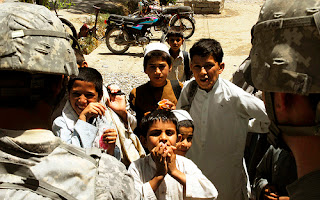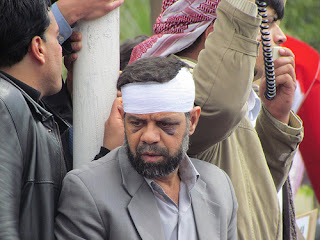With all apologies to my wonderful Writing for Online Media professor, Nick Leshi, this will be my last blog post. While I truly enjoyed the experience, and wouldn’t have traded either this opportunity to exercise my writing skills or this chance to share Middle Eastern news and commentary, I simply will not have time to continue this blog as I begin my packed summer schedule.
I find it fitting that I began this exercise as the Middle East began to deal with major changes, and I am ending it as the impacts of another history-changing event unfold.
When I started, Tunisia and Egypt were completely overturning their government. Leaders everywhere were taken aback as slowly, surrounding countries began to follow suit; even now, we are still watching as Libya continues to fight for its freedom from Qaddafi, Syria fights for a break from oppressive traditions, and Yemen fights for civil rights. Truly, its been simply awe-inspiring to watch.
Now, I leave this blog one week after another major event: Osama bin Laden was killed by Navy Seals and C.I.A. operatives.
Before I begin my main discussion, I want to say that I applaud Obama’s decision to keep the photographic evidence from the public eye. As a journalism student, it pains me a little to say this, yet I think the decision keeps the death from crossing the line from justice to vengeance. This was a classy move by a president facing a lot of criticism and a lot of unsolicited criticism.
Photo Courtesy of osamabinladen
A fake photograph of Osama's body.
Almost immediately after the news broke, a huge debate (in which I have partaken) began over the degree to which one can celebrate the death of a man, as evil as he may be.
Personally, I am proud of our troops, and I celebrate their victory. Bin Laden’s death was a goal, but not the only goal, of the war in Afghanistan. The goal continues to be an end to terrorism; we are certainly not there, yet we were able to take down one of the biggest threats to United States security our generation has ever faced.
I was not in New York or New Jersey on September 11, 2001, but I still remember getting into the car that day after school, and my mom telling me the news. I didn’t understand the gravity until the night, when the number finally hit me. Three thousand. Nearly half my town. Nearly 15 times the size of my grammar school. Gone.
Photo Courtesy of Sister72
Light beams representing the Twin Towers, one of the many ways the September 11 attacks were memorialized.
Still, what I am celebrating is not this man’s death. In an ideal world, he would be alive and in front of a jury or tribunal, but in an ideal world he would have never have orchestrated these attacks. Thus, I can only celebrate that the closest thing we can have to justice has been achieved. The bin Ladens are in my thoughts, as it is never easy to lose a family member, but most of all the families of the victims of September 11 are in my thoughts, because no one should have to lose a family member in an act of senseless violence.
Of course, as I end nearly every post, who knows what happens next; even now, one week later, no one knows how much to beef up security, how much to trust Pakistan, or really much of anything.
Most recently, the Al Qaeda announced that it plans to carry our revenge against the United States; I obviously hope it does not, as that simply perpetuates the cycle of violence. In order to prevent this retribution, however, what needs to happen? More drones? More raids? More people are going to end up killed, and this is tragic, yet I don’t know how to ultimately stop all deaths, and I don’t think any military commander I could talk to could give me a guaranteed answer either.
The Middle East has produced a lot of violence over the recent years. Historically however, the countries are rich in histories of prosperous empires and lavish kingdoms, with the pharaohs of Egypt and the riches of Persia. Conversely, our “civilized” world has historically brought about the Trail of Tears and the Inquisition. No area is perfect at an given time.
Photo Courtesy of Celeste Small
The pyramid and the sphinx, two of the many treasures offered by ancient Egypt
Thus, let us aim for peace in the Middle East, and in the meantime, remember that each Middle Eastern person is an individual worthy of respect, and that each country is a territory with its own priceless contributions to the world but also with its own shortcomings. These countries deserve respect and dignity, and I wish them the prosperity their citizens deserve.















